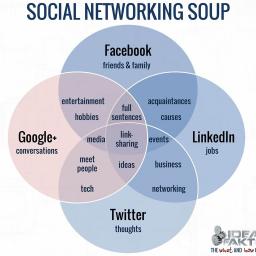Social Networking Enters the Age of Angst
 This is either the age of social networking, or it's not. It's either the future, or it's already a has-been. What the heck is going on?
This is either the age of social networking, or it's not. It's either the future, or it's already a has-been. What the heck is going on?Forbes has printed a thoughtful article on why Google Plus has failed to thrive . The Atlantic has written a piece suggesting Twitter is on the decline . Facebook's interest among teens seems to be slowing, while their "page reach" is down by 50% .
So, what's going on? Is it because, post- Snowden , everyone is tired of being spied on? Has everyone moved on to cooler platforms? Has everyone ditched social networking and gone back to Usenet ? Is it possible, as one author suggests, that privacy is now overtaking sharing on the 'Net? Or has everyone just found something more productive to do, like work in the garden?
[Note: this article has been cross-posted nowhere else. :) Want to comment? Here's the place.]
What isn't surprising is that these things are dying, it's that they ever got so damn popular to begin with. Facebook offers nothing that hasn't been around in free and open forms for years without locking you into a single company's walled garden. A list of features and corresponding preexisting services:
Messaging ->E-mail
Newsfeed/Wall ->Blog
Photos ->Webserver/FTP/various server applications for gallery generation
Groups ->Web fora, usenet...
Chat ->IRC, XMPP, and other often more closed forms.
Event Planning ->shared calendars (though I'll admit, Facebook did at least implement this in a more easily accessible way than most, at least when they first rolled it out).
Most of what Facebook has to offer is a UI slapped over a bunch of preexisting utilities, and the cost is that they get all of your data, and that as long as you're relying on their services you can't simultaneously easily network with people who aren't without using redundant services to talk to people on different platforms. Well, for one, some people (and I've no delusions that it's "most") are just simply getting fed up with their data being slurped up and used to sell ads to target at them, or worse, funneled to law enforcement/employers. For another, the simple fact that there are people you may want to network with that aren't on Facebook means you'll need to engage in some of these alternatives for the various services Facebook offers. THAT seems to be a big weak point for these closed private platforms, because it's what trains people who either never learned to use the alternatives before getting on Facebook, or who forgot about them in the frenzy to jump on the next big thing. When you realize you can have everything Facebook offers without giving anything up for it at all, and often getting what amounts to more freedom to craft your own UI to streamline it all if you choose to, it kind of makes you wonder why you would do otherwise.
For the matter of G+ specifically, I think it mostly just has a lot more competition in the form of Facebook than Facebook had in the form of Myspace, and that G+ doesn't really offer enough that significantly distinguishes it. Myspace, if we can all remember back, was an absolute mess of a site, and half the time when you came upon a person's profile, music would immediately start playing, there'd be flash elements strewn about, and often broken scripting due largely to just how much Myspace allowed users to customize their profiles. And beyond even the user-created mess, the site itself just never had a very friendly UI, and the privacy settings were all but not there at all. Facebook's arrival to your average Myspace user of the day was like the coming of the Messiah with how many fixes it made and features it brought, even if it was just yet another corporate walled garden. And also, if we can remember back to 2004, when Facebook hit the scene, it had no ads, it was only for college students, and only people at your school could see your profile at all unless you specifically messaged with them (or at least exchanged pokes). They gradually added the more and more insidious aspects of the site, and relied on the growing ubiquity of the site to keep people from bucking them off, and for the most part, it's been a winning strategy, though it almost certainly is unsustainable in the long run. Google+ has none of this to offer, and unlike the other alternatives for talking to people not on your social network of choice (email, irc, xmpp, etc), it's only useful for networking with people on Google+, meaning that you'll end up having your Facebook to network with most people, your G+ to network with people who somehow thing Google is great but Facebook is the devil, and STILL having to maintain an email account at the very least for those that don't use social networking. That's a lot of timeshare to expect from the average user, and it's just not going to happen. Google+ will continue to be used by nobody but Ingress players until they shutter it, and expecting otherwise by this point would be silly.